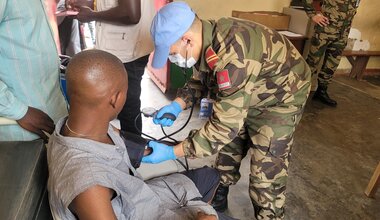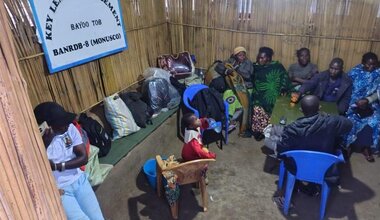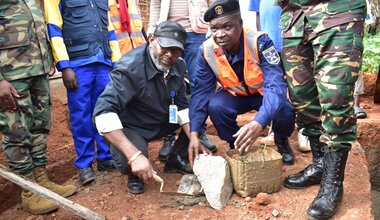Nord Kivu Brigade Commander bids farewell to DRC
Photo: MONUSCO
Kinshasa, 5 October 2011 – The soft spoken Brigadier-General Chandi Prasad Mohanty is on his way out of the Democratic Republic of Congo (DRC) after more than a year of service in this country with the blue helmets as Commander-in-Chief of the Nord Kivu Brigade. Ge.l Mohanty vividly remembers he date he landed in the DRC. "1st September 2010," he simply said. Since that date, he took control of the Nord Kivu province, eastern DRC, known to be one of the most affected areas by armed groups ' activities in the country.
Gen.Mohanty arrived at a time when the morale of the troops was very low. Three Peacekeepers had just been killed in an attack by an armed group, and the United Nations Organization Stabilization Mission in the DRC (MONUSCO) was under tremendous pressure to improve its image both within and out of the DRC. "What we did was to organize extensive patrols in and around villages, including foot, motorized and market patrols. The troops were encouraged to stop at market places and engage with the local population. The soldiers were ordered to venture out further during their patrols, be it during the day or at night. This was a change in strategy from the past," the General said.
There is one characteristic of Nord Kivu province, which made Gen. Mohanty's job even more trying. In this province, "70% of villages are inaccessible by road," he said. So what did he do? He initiated a new concept nick-named Operation Ulinde in one of the local languages, which means "protection". It consisted of conducting regular air surveillance over these villages using Lama Helicopters. In addition to that, he led his troops to conduct joint operations with elements of the National Armed Forces based in the area. This strategy, Gen Mohanty explained, "Changed the brigade from being reactive to becoming preventive and proactive."
A total of 15 major operations were conducted to provide protection to the civilian population in the course of the year. These included eight airborne operations, and seven joint operations with the FARDC. As a result, the rate of criminal activities dropped substantially.
To gain the trust of the local population, non-military activities were undertaken such as "Urafiki" meetings (friendly meetings) with villagers, and providing vocational training for instance in carpentry, auto-mechanic, and computer science. However, one noble concept, which left a real impact on the local population, was the early warning system, which consisted of providing a hotline that could be triggered by members of the community in the event of an incident. "This is one of our best success stories," the Gen. confided.
Although he radiates with fulfillment, Gen. Mohanty was quick to admit that there are still a lot of challenges lying ahead for MONUSCO. Among them are cases of ethnic cleansing or violence, resulting in the displacement of hundreds of villagers, thereby creating an emergency situation, in which people are in dire need of humanitarian assistance. The return of these internally displaced people is a major undertaking, and will not happen overnight.
Another challenge is the upcoming elections, which are just two months away with their corollary of worries such as physical clashes, and acts of intimidation from the very armed groups that are lurking in this province. "With all these problems, people expect us to be everywhere at the same time. But it is not possible, definitely not with the number of troops at our disposal," he deplored.
Penangnini Toure/ MONUSCO
 UN
UN United Nations Peacekeeping
United Nations Peacekeeping



